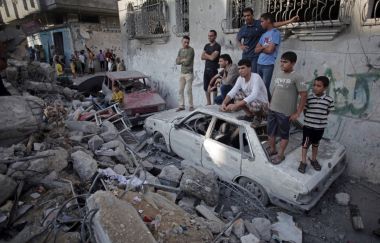Gaza reaches crisis point as agencies call for ceasefire

Humanitarian needs in Gaza are moving towards crisis point as the violence escalates, aid agencies warned.
Oxfam and Christian Aid joined international calls for a ceasefire as Palestinian rockets continued to be fired into Israel, damaging schools and other buildings and injuring civilians, at least one critically. There have been reports that Israel is preparing troops for a possible ground invasion of the Gaza Strip.
More than 100 people in Gaza are now reported to have been killed and more than 600 people injured in the Isaeli response to the Palestinian rocket attacks, with many of the casualties reported to be women and children. Gaza has been under blockade since 2007.
Oxfam country director Nishant Pandey said vital water and sanitation infrastructure had now been destroyed or badly damaged by Israeli airstrikes. "Services are now struggling to cope and the insecurity is making it difficult to deliver aid," he said.
Oxfam's partners have had to suspend efforts to chlorinate water supplies in Gaza because of the ongoing violence. Pandey said that 90 percent of water in Gaza is already unsafe to drink. Water supplies for 100,000 people have been cut off because a pipeline in Beach Refugee Camp and two wells in Gaza City were hit and destroyed. "Water pumps and sewage plants could stop functioning within days because of severe shortages of fuel," Pandey said.
An Oxfam-supported hospital that has treated more than 50 casualties from airstrikes already warned that it will run out of fuel in the next few days, putting essential operations at risk.
The hospital's medical director, Ahmed Manna, said: "About 40 percent of the casualties we've treated are children and many others are pregnant women. Our medical staff are working 24-hour shifts because of the need and it's dangerous to go home. If fuel is not available within the next few days the hospital will have to shut down many of its services to 360,000 people in Gaza. This is the only centre in north Gaza with a specialised obstetric unit for pregnant women."
An Oxfam-supported mobile health clinic that provides primary healthcare to several thousand families in northern Gaza yesterday had to suspend all its services because routes there had become too dangerous to travel. A health centre run by an Oxfam partner in Beit Hanoun that specializes in pre and post natal care was badly damaged and is now unable to operate. "We are supporting other clinics that are continuing to try to provide services, but many are in areas that have seen heavy airstrikes and local people are scared to try and reach them," Pandey said.
The sewage plant which serves half of Gaza City has been badly damaged, with 25 million liters of raw sewage spilling into the sea and increasing the likelihood of disease caused by poor sanitation. It is expected to take months to fully repair.
Oxfam partners are assessing whether they can distribute more food vouchers to families in need. Many people are afraid to go to the shops to buy essentials. Hundreds of farmers are unable to get to their fields. Meanwhile, the UN is reporting that at least 32 schools have been affected by shelling, dozens of homes destroyed and more than 2,000 damaged.
Christian Aid said it was "appalled" at the spiralling levels of violence and urged the UK government to help broker a ceasefire.
The violence follows the deaths of abducted teenagers in Jerusalem and Hebron, sustained rocket fire into Israel and Israeli warplanes, naval vessels and tanks attacking Gaza.
One Israeli civilian and two Israeli soldiers have been injured while the Israeli offensive that began on 7 July has killed 80 Palestinians, including 22 children, and injured more than 570 people, according to UN figures.
Most of the dead and injured appear to have been civilians, despite Israeli claims that it is targeting militants. Two days ago there were reports that a missile that hit a cafe in Khan Younis, Gaza, where football fans were watching the semi-final of the World Cup, killed six and injured 15.
The air strikes have also destroyed or rendered uninhabitable an estimated 342 homes in Gaza, displacing about 2,000 people most of whom have moved in with relatives.
Janet Symes, Christian Aid's head of Middle East said: "An immediate ceasefire is critical to stop innocent civilians paying the ultimate price. Access to adequate healthcare, fuel and food is under serious threat. This destruction needs to end so that people can get the help they so desperately need.
"It is due to the failure of peace talks and lack of genuine effort to find a viable solution to the conflict that we are witnessing yet more innocent civilian casualties. If the international community does not act with urgency to both stop the situation escalating and pursue an inclusive and comprehensive peace, then they will be condemning yet more innocent people to despair.
"Christian Aid implores all Israelis and Palestinians to take urgent steps in order to avoid more civilian deaths and suffering, and find a long term solution to end the conflict. We urge the UK government to put its full backing behind efforts to broker a ceasefire now."
UN Secretary General Ban Ki-moon said this week that the situation "is on a knife-edge", urging Israel and Palestinian militants to end hostilities, with a warning that the "region cannot afford another full blown war." The UN Security Council held an emergency meeting on Thursday afternoon, where Ban Ki-moon stated that it was more urgent than ever to avoid another Israeli-Palestinian war and urged both leaders to show statesmanship and agree to an immediate cease-fire.











